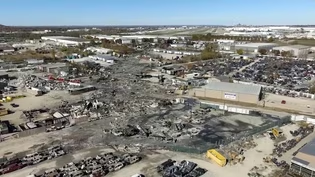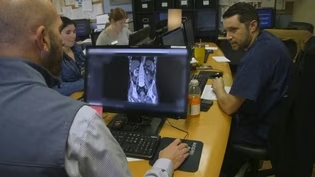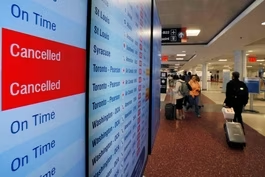
November 8, 2025 - PBS News Weekend full episode
11/8/2025 | 26m 44sVideo has Closed Captions
November 8, 2025 - PBS News Weekend full episode
Saturday on PBS News Weekend, air travelers cope with reduced airline schedules, while the Supreme Court allows the Trump administration to withhold food benefits for tens of millions of Americans for now. How a new federal investment may help struggling rural hospitals keep their doors open. Plus, what a trending relationship test reveals about the importance of life’s little moments.
Problems playing video? | Closed Captioning Feedback
Problems playing video? | Closed Captioning Feedback
Major corporate funding for the PBS News Hour is provided by BDO, BNSF, Consumer Cellular, American Cruise Lines, and Raymond James. Funding for the PBS NewsHour Weekend is provided by...

November 8, 2025 - PBS News Weekend full episode
11/8/2025 | 26m 44sVideo has Closed Captions
Saturday on PBS News Weekend, air travelers cope with reduced airline schedules, while the Supreme Court allows the Trump administration to withhold food benefits for tens of millions of Americans for now. How a new federal investment may help struggling rural hospitals keep their doors open. Plus, what a trending relationship test reveals about the importance of life’s little moments.
Problems playing video? | Closed Captioning Feedback
How to Watch PBS News Hour
PBS News Hour is available to stream on pbs.org and the free PBS App, available on iPhone, Apple TV, Android TV, Android smartphones, Amazon Fire TV, Amazon Fire Tablet, Roku, Samsung Smart TV, and Vizio.
Providing Support for PBS.org
Learn Moreabout PBS online sponsorshipJOHN YANG: Tonight on PBS News Weekend, air travelers cope with reduced airline schedules as the Supreme Court allows the Trump administration to withhold food benefits for now for tens of millions of Americans.
Then, how a new federal investment may help struggling rural hospitals keep the doors open.
And what social media's latest viral relationship test reveals about the importance of life's little moments.
WOMAN: When we notice something or we raise something and our partner turns toward us instead of, you know, looking at their phone and saying, huh, it feels really good.
(BREAK) JOHN YANG: Good evening, I'm John Yang.
Whatever optimism there may have been that lawmakers would reach a deal this weekend to end the longest government shutdown on record has faded as Senate Democrats demand a one year extension of Affordable Care Act insurance premium subsidies.
President Trump floated an idea of his own terminate per dollar spent the worst health care anywhere in the world, Obamacare.
That's clearly a nonstarter for Democrats.
The Senate held its first Saturday session since the 39-day shutdown began, but no votes were scheduled.
Tonight we're following two of the most widespread effects felt by Americans, air travel and nutrition benefits.
On the second day of reduced flights at 40 airports, the aviation data company Cirium said nearly 4 percent of flights were canceled and about 2 1/2 percent have been canceled for tomorrow.
Randy Babbitt was FAA administrator in the Obama administration.
Mr.
Babbitt, is this working?
Are reduced flights reducing delays?
RANDY BABBITT, Former FAA Administrator: No, they're reducing the flights for the primary purpose and a good purpose of making the system safe.
They're suffering a loss of controllers at the various stations.
They're not interchangeable.
And to ensure the system operates safely, you just have to reduce traffic down to the level of the number of controllers you can put up.
JOHN YANG: Is this sustainable?
RANDY BABBITT: No, it's actually going to continue to accelerate in the wrong direction.
The longer we ask people to work without a paycheck, the longer we ask people to work 10, 12, 14-hour shifts, you just can't sustain that.
People are calling in sick they're tired.
It's an intense job.
The controllers are well trained and there's a lot of stress in that job and you can't keep doing it.
You know, we have the staffing levels where they were for a good reason, and we're not achieving that level of controllers, you know, on site and on their stations.
JOHN YANG: I want to go back to the point you point made about controllers not being interchangeable.
It's not that you can sort of see how many controllers are working nationwide.
It depends on each airport, each air traffic control center.
RANDY BABBITT: Oh, absolutely.
There's a big difference between being an enroute controller or a tower controller or an approach control person.
Those are different jobs and they're not interchangeable.
Someone who's working enroute cannot go the next morning and be in the Richmond tower.
You know, it takes months of training to make those transitions.
JOHN YANG: And controllers, are you talking about how they're sort of being stressed now?
No pay, many of them having to call out to work other jobs to get pay.
They were already stressed even before this began.
The system was already stressed, wasn't it?
RANDY BABBITT: Yes.
We're still recovering post-COVID.
You know, they let, like a lot of companies did, they let people go because the system was only operating at 30 percent at the peak of COVID.
But you don't just call them back.
A lot of them early retired.
And second, if you have to hire them, it takes several years to train a controller to be fully up to speed and be able to go into the different control positions.
JOHN YANG: Former FAA administrator Randy Babbitt, thank you very much.
RANDY BABBITT: Thank you.
Good luck.
JOHN YANG: And now the Supplemental Nutrition Assistance Program, or SNAP, which provides payments to 40 million low income Americans.
Last night, the Supreme Court blocked for the time being a judge's order that the administration pay full SNAP benefits for November.
Amy Howe of SCOTUSblog is PBS News Supreme Court analyst.
Amy so explain, put it simply, what did the Supreme Court do last night?
AMY HOWE, SCOTUSblog: So I'm not sure there's a way to put it simply, but I'll try.
Last night, the Trump administration came to the Supreme Court around 6:45 asking the justices to pause a ruling by a federal judge in Rhode Island that would have required the Trump administration to fully fund the SNAP program for the month of November.
The U.S.
Solicitor General, D. John Sauer, he's the government's top lawyer in the Supreme Court, said, yes, this is a crisis, but it's a crisis that only Congress can fix.
And he asked the justices to act quickly to issue what's known as an administrative stay, to which essentially would put the judge's ruling on hold to give the justices time to rule on the government's request by 9:30 last night.
And the government came to the Supreme Court because it had made a similar request from the U.S.
Court of Appeals for the First Circuit, which is based in Boston and hears appeals from Rhode Island.
And that court, the First Circuit declined to issue the administrative stay, but said, we will act quickly on your request to put the ruling on hold while you appeal.
Shortly before 9:30 at 9:17 last night, Justice Ketanji Brown Jackson issued that administrative stay.
Justice Jackson is what's known as the circuit justice for the First Circuit, which means that all of the emergency requests go initially to her.
And it's not unusual for the circuit justice to issue these kinds of administrative stays.
And she said the reason I'm issuing this stay now is because we expect the First Circuit to act quickly.
And so she put the federal judge's ruling on hold for 48 hours after the first circuit acts.
We don't know exactly when that's going to be, but it could be this weekend, it could be on Monday.
But it means that once the First Circuit does act, then the ruling will only be on hold for 48 more hours.
So this is going to move really quickly, I think.
But the Reader's Digest version of it, so to speak, is that at least for now, the requirement that the government fully fund the November SNAP program is on hold.
JOHN YANG: And this is, as you say, an administrative stay to give the court time.
Does it say anything about the Supreme Court's view of the merits of the arguments on either side?
AMY HOWE: No, it really just says because we expect the First Circuit to act quickly, given the First Circuit's representations that it is going to act quickly.
We're going to go ahead and put this on hold for now.
Things were just moving very, very fast.
And I think it was an effort to give the justices time to decide for the justices to act.
They are certainly these days accustomed to getting requests on their emergency docket, but to try and act that quickly is really a very expedited decision.
JOHN YANG: PBS News Supreme Court analyst Amy Howe, thank you very much, Amy.
AMY HOWE: Thank you.
JOHN YANG: And tonight's other headlines.
The Federal Aviation Administration has ordered the grounding of MD-11 cargo planes after this week's deadly crash in Louisville, Kentucky.
UPS and FedEx had already voluntarily grounded theirs.
A UPS MD-11 crashed Wednesday after taking off, killing all three pilots on board and 11 people on the ground.
Investigators said the plane's left engine detached from the wing.
MD-11s make up less than 10 percent of the two cargo airlines fleets.
They are no longer used in scheduled passenger service.
A federal judge in Oregon has said President Trump cannot deploy National Guard troops to Portland.
The case centered on whether federal intervention is warranted by protests against immigration authorities in Portland, which the president called war ravaged.
In her opinion, Judge Karen Immerget, a Trump appointee, said there is no evidence that these small scale protests have significantly impeded the execution of any immigration laws.
It's the first definitive ruling against the administration's use of the National Guard to deal with protests that will likely be appealed.
In Gaza, Palestinian health officials say more bodies have been recovered from the rubble, raising the death toll to more than 69,000.
Conditions on the ground remain bleak.
Those sheltered in tents have to contend with piles of garbage, seeping sewage and hazardous waste that's been accumulating since the war began.
MAHMOUD HELLES, Displaced Palestinian (through translator): People here had to live in this place because there is no safe place in Gaza.
This place is very, very difficult.
It is full of diseases and epidemics because of war remnants.
All that is there now are people coexisting with diseases, insects, flies and mosquitoes.
JOHN YANG: Early today, Israel turned over the remains of 15 Palestinians in exchange for the body of an Israeli hostage Hamas released yesterday.
A blast of cold, dry arctic air from Canada is sweeping south this weekend and early next week, sending temperatures plunging in the middle and eastern United States.
Parts of the Midwest and New England could see the season's first snow accumulation.
The chill is expected to extend to the Southeast, where overnight lows could dip to freezing.
And geologists say one of the world's most active volcanoes may soon begin spewing fountains of lava.
A glowing vent splattering molten lava and overflows from the Kilauea volcano on Hawaii's Big island, all signs that the next episode is imminent.
The volcano has been active for nearly a year, erupting periodically at hours long intervals.
The last big eruption was in October, when lava shot into the air nearly 1300 feet.
That's taller than the Empire State Building.
Still to come on PBS News Weekend, struggling rural hospitals compete for billions of dollars in federal funds and what a viral test on TikTok may reveal about your relationship.
(BREAK) JOHN YANG: Health systems in rural America are struggling.
Many are losing money, and over the past decade, more than 100 have closed.
During the debate over the one big, beautiful budget bill, some lawmakers express concern that Medicaid cuts would threaten rural health systems, which rely on those payments to keep their doors open.
SEN.
SUSAN COLLINS (R) Maine: Rural providers, especially our rural hospitals and nursing homes, are under great financial strain right now.
When these facilities close their doors, the people they serve are often left behind without access to health care.
JOHN YANG: To address those Medicaid shortfalls, Congress approved one of the single biggest investments in rural health, a $50 billion rural health transformation fund.
Applications for the fund were due this week.
Ali Rogin spoke with Carrie Cochran-McClain, Chief Policy Officer for the National Rural Health Association, about how states hope to use the money.
ALI ROGIN: Carrie welcome to the program.
First, can you remind us why this rural Health Fund was included in this budget bill?
CARRIE COCHRAN-MCCLAIN, Chief Policy Officer, National Rural Health Association: Well, when we first started talking about the changes to Medicaid, that would have significant impact on the not only coverage of individuals living across the country, but the providers who care for them.
So as the analysis and the debate continued in Congress, we realized that rural hospitals would be disproportionately impacted.
Given that about half, if not a little more, of the rural hospitals in this country operate with negative margins, they really don't have the room to take additional cuts that were being proposed in the Medicaid changes.
So, Congress developed the Rural Health Transformation Program, which was really initially discussed as a way to offset some of the reductions in funding and reimbursement that these rural hospitals were intending or will be receiving.
ALI ROGIN: So this funding is $50 billion over five years.
Half of that funding is distributed evenly among the states.
The other half is open to these applications.
I want to play for you what Centers for Medicare and Medicaid Director Mehmet Oz said recently about what he's hoping to see in these applications.
DR.
MEHMET OZ, Administrator, Centers for Medicare and Medicaid Service: We're not talking about paying bills and, you know, rounding the edges.
We want transformative big ideas that will dramatically change our expectations of the rural health care system.
ALI ROGIN: So how does that match up with the challenges that the rural health care system is facing and where the money would best help that system?
CARRIE COCHRAN-MCCLAIN: We really have decades of minimal margins, not a lot of funding that has kept rural America from moving forward with some of the other transformation we're seeing in the healthcare system.
This funding is an amazing once in a lifetime opportunity to kind of even that playing field and help rural America move forward in addressing a lot of those really tough challenges we see in our health outcomes and life expectancies.
However, our concern is while this money is great and a very important step forward, we still need the day to day reimbursement to be able to pay these providers for the services they're giving.
ALI ROGIN: And to that point about reimbursements, many of the lawmakers when they were debating this bill, including Republicans Susan Collins of Maine, Josh Hawley of Missouri, they said that they were worried that if these Medicaid reimbursements were to diminish for doctors and providers, that it might force some rural hospitals to close their doors.
And yet in the final version of this bill, the amount of money that these systems can take to go to payments caps out at 15 percent.
That seems like a bit of a discrepancy there between the problem and this proposed solution.
CARRIE COCHRAN-MCCLAIN: Yeah, I think it's definitely a different conversation than what happened during the congressional discussions.
And some of that is in statute and some of that is the direction that the administration has taken with the funding.
They are not wrong that I think ultimately we want to get to this place where we are focused on value and outcome and that we are not worried about paying for widgets.
But in order to get there, we still have to sustain the providers who are providing care for the individuals in the communities.
ALI ROGIN: What sort of programs are you seeing states propose in order to take advantage of these funds?
CARRIE COCHRAN-MCCLAIN: So the funds are focused in five strategic areas.
Those being shoring up a health care workforce to take care of individuals, helping to support the MAHA agenda, so dealing with chronic disease and food insecurity and other things in rural areas, helping sustain rural hospitals.
So helping rural hospitals run more efficiently and help them build kind of volumes and economies of scale.
And then the other two areas really focus on innovation, so moving towards value and quality and then also figuring out how do we bring technology innovations like AI and remote patient monitoring into the rural context.
So states are putting forward proposals that address any and all of those things.
ALI ROGIN: The Centers for Medicare and Medicaid released the instructions to apply for this funding just in mid-September.
And then the deadline for these applications was just this week.
CARRIE COCHRAN-MCCLAIN: Yeah.
ALI ROGIN: It's not a lot of time -- CARRIE COCHRAN-MCCLAIN: Not a lot of time.
ALI ROGIN: -- to come up with these game changing proposals.
CARRIE COCHRAN-MCCLAIN: Yes.
So the way that the law was written, the funds had to be distributed by the end of this calendar year, which meant a scramble for everybody involved.
And one of the challenges is that, you know, these problems we've had on in rural health care.
They're not new.
So states are asked in six weeks to come up with a plan totally transform their rural health care system to make sure it's a plan that they can actually implement and is actionable.
Because if it's not, they may have some of that money pulled back or they may not have money moving forward.
So again, it's going to be CMS as they review these and get the final decisions out.
It's going to be really important to make sure that we are holding the funding accountable to going to rural providers, rural patients, rural communities.
We want to make sure that this really ends up moving the needle in rural America.
ALI ROGIN: Carrie Cochran-McClain, thank you so much.
CARRIE COCHRAN-MCCLAIN: Thanks for having me.
JOHN YANG: One of the latest relationship tests on social media to go viral is the bird theory.
JOHN YANG (voice-over): It starts with a casual comment.
WOMAN: You know, when you were inside, I saw a really pretty bird.
MAN: A bird.
WOMAN: I saw a bird today.
WOMAN: I saw a bird today.
WOMAN: I forgot to tell you that I saw a bird today.
WOMAN: A bird.
JOHN YANG (voice-over): The test is how the partner responds.
MAN: Wait, I saw a blue jay the other day, too.
No, literally, I saw one on my run.
JOHN YANG (voice-over): Do they engage?
MAN: Pointed beak, rounded beak.
JOHN YANG (voice-over): Or not?
MAN: Why are you telling me?
JOHN YANG (voice-over): These tests have racked up millions of views.
JOHN YANG: They're based on a theory developed by couples researcher John Gottman about the importance of engaging with partners when looking for a connection.
But what do they really tell us?
Alexandra Solomon is a licensed clinical psychologist, an adjunct professor at Northwestern University, and the host of a podcast called Reimagining Love.
Alexandra, how valuable is this test?
What does it really reveal?
ALEXANDRA SOLOMON, Licensed Clinical Psychologist: You know, these tests come and go.
And I tell you what, this one is particularly sneaky because it's - - it does have Gottman's research behind it.
And there's a wish that all of our relationships could boil down to one little test like that.
So although there's validity, it's putting too much weight in one little micro moment.
JOHN YANG: Well, tell us about Gottman's theory.
Tell us about that.
ALEXANDRA SOLOMON: What Gottman says is that romantic relationships are not made up of the grand sweeping gesture, you know, the rose petals on the bed and all of the sort of fairy tale ideas that we grow up with.
In fact, romantic relationships, the healthy ones, are made up of a series of thousands and millions of micro moments of connection that build trust and safety and authenticity between partners.
That's what this test is about.
It's a bid for connection.
JOHN YANG: You know, the New York Times calls this social media's relationship yardstick du jour.
And you talked about how these come and go.
Why are we so drawn to this?
ALEXANDRA SOLOMON: We're drawn to it because there are few things in our lives that make us feel quite as vulnerable as our intimate relationships do.
The stake are high.
The consequence of losing the person that we love, you know, through a breakup, through divorce, certainly through death, those consequences are very, very big.
You know, we risk heartbreak.
And so I think we are forever looking for evidence to the -- to answer the question, are we okay?
You know, are we okay?
Are you with me?
Do you have my back?
Do you see me?
Do I matter to you?
JOHN YANG: And what's the motivation for people to put these online and have strangers discuss it?
ALEXANDRA SOLOMON: Well, John, here's where the rubber hits the road.
I do think that especially in these scenarios we're seeing where people have taped their partner without their consent, you know, that's a kind of boundary violation.
And I think that if somebody is tempted to test their partner in this way, the first step is to check in with themselves, you know, what is -- what's going on here?
And we really have normalized that.
We sort of live these two lives.
We live the flesh and blood life of ours and we live this online life.
So I think we really have normalized that.
It seems kind of, you know, ordinary or no big deal right now to be showing little windows into our world online.
But I think it's a problem, and I think we ought to be careful.
JOHN YANG: This does show a willingness to sort of let the other partners world in something that they value in the world they found interesting.
Does that tell us anything?
ALEXANDRA SOLOMON: Absolutely, absolutely.
There's, you know, it feels really good when we notice something or we raise something and our partner turns toward us instead of, you know, looking at their phone and saying, uh-huh, or not responding at all.
It's really painful.
Those breaks in connection are really painful for us.
And those moments of attunement where our partner turns their attention toward us feel really good.
So there's -- that's where the validity is.
The validity is that our desire to connect with our partner in these small, seemingly insignificant ways, those matter.
It makes sense that people want, you know, to have the partner ask follow up questions about this little bird that.
JOHN YANG: We see mostly in these women testing men.
What does that tell you?
ALEXANDRA SOLOMON: Well, it tells us a lot of things.
It tells us that we teach little girls and women that they are the ones who've got their finger on the pulse of the relationship, that they should have their finger on the pulse of their relationship.
Research has found that actually by the age of three, we parents talk less to our little boys and we touch our little boys less.
So we basically socialize into our boys who then grow up to become men.
And the idea that communication is largely transactional, it is a means to an end, it is goal oriented.
By contrast, we teach our girls and our women that talking is how I show you my world.
Talking is how you invite me into your world.
So then when a man and a woman come together intimate partnership, there's this funny sort of paradox where she really values this interactional communication.
And he may not be quite as accustomed to that.
So the conversation about the bird, if he can't see the point of why we're talking about the bird, he may not be trying to ignore her or shut her down.
He just isn't quite sure what the point is.
JOHN YANG: How does that show up in your practice when you see patients in your practice?
ALEXANDRA SOLOMON: Well, I've been at this for a very, very long time.
And when I am sitting with a, you know, a heterosexual couple, I can pretty much guarantee that part of our work is going to be helping him develop the capacity for those kinds of conversations that don't seem to be going anywhere, where there isn't a goal in mind, but where the communication is truly just building intimacy.
You know, oftentimes she wants more understanding from him.
She wants to know what's going on inside of his head and what it feels like to her is that he's holding out on her.
You know, he's not opening up.
But actually, in fact, as he starts to open up in couple therapy, nine times out of 10, whatever he's sharing with her in the couple therapy session is actually the first time he said it out loud, maybe even the first time he's thought it.
So that's very often the case in couple therapy, that we're helping men develop that capacity for conversations that are intimacy driven and that deepen intimacy.
JOHN YANG: Clinical psychologist Alexandra Solomon, thank you very much.
ALEXANDRA SOLOMON: Thank you.
JOHN YANG: Now online, as Americans shop for health insurance after the expiration of enhanced premium tax credits, experts say don't panic, do stay vigilant and expect to spend more for health care.
All that and more is on our website, PBS.org/NewsHour.
And that is PBS News Weekend for this Saturday.
I'm John Yang.
For all of my colleagues, thanks for joining us.
See you tomorrow.
News Wrap: UPS, FedEx ground MD-11 planes after deadly crash
Video has Closed Captions
Clip: 11/8/2025 | 3m 9s | News Wrap: UPS and FedEx ground MD-11 cargo planes after deadly crash (3m 9s)
Rural U.S. hospitals compete for billions in federal funding
Video has Closed Captions
Clip: 11/8/2025 | 6m 44s | Struggling rural hospitals compete for billions of dollars in federal funding (6m 44s)
Shutdown disrupts air travel, food assistance for Americans
Video has Closed Captions
Clip: 11/8/2025 | 6m 44s | Longest shutdown on record disrupts air travel and food assistance for Americans (6m 44s)
What the ‘bird theory’ test may reveal about relationships
Video has Closed Captions
Clip: 11/8/2025 | 6m 50s | What the ‘bird theory’ test may reveal about your relationship (6m 50s)
Providing Support for PBS.org
Learn Moreabout PBS online sponsorship
- News and Public Affairs

FRONTLINE is investigative journalism that questions, explains and changes our world.

- News and Public Affairs

Amanpour and Company features conversations with leaders and decision makers.












Support for PBS provided by:
Major corporate funding for the PBS News Hour is provided by BDO, BNSF, Consumer Cellular, American Cruise Lines, and Raymond James. Funding for the PBS NewsHour Weekend is provided by...



